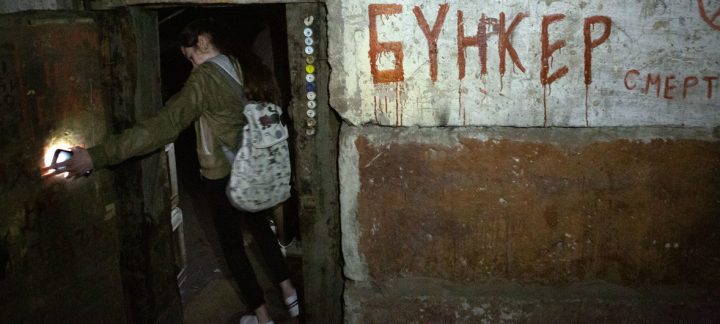Marking the fifth anniversary of the 2015 Minsk II agreement, the UN political chief told the Security Council on Tuesday, that along with the Minsk Protocol and the Minsk memorandum, it remains “the only agreed framework” for a negotiated, peaceful settlement of the conflict in eastern Ukraine.
Rosemary DiCarlo, Under-Secretary-General for Political Affairs, also recalled that the Secretary-General has consistently expressed the UN’s “strong backing” for the lead role of the Normandy Four, the Trilateral Contact Group (TCG), and the OSCE to find a peaceful settlement of the conflict in eastern Ukraine and called for “a revitalization of these efforts”.
Making progress
Since her last update in mid-July, Ms. DiCarlo offered hope for “long-elusive progress” in implementing the Minsk provisions, including key security and political aspects.
“Most notably”, she said, “on 9 December, and after a three-year hiatus, the leaders of France, Germany, Russia and Ukraine met in Paris under the so-called Normandy Format” and called for, among other things, immediate measures to stabilize the situation.
The leaders committed to fully implement the ceasefire and to support an agreement within the contact group on three areas aimed to disengage forces and equipment.
“They encouraged the Trilateral Contact Group to facilitate the release and exchange of conflict-related detainees and committed to supporting an agreement within the Group, on new crossing points along the line of contact, based primarily on humanitarian criteria”, she said.
Moreover, she said that the participants recalled that the Organization for Security and Co-operation in Europe (OSCE) Special Monitoring Mission requires secure access throughout Ukraine to fully implement its mandate.
Referring to her first visit to the country in December, she noted that her “interlocutors were clear…to see tangible progress in the negotiations”.
While many stressed the need for greater involvement of women in the peace efforts, some looked to improve the humanitarian situation for ordinary people and others to strengthen political that would support initiatives to ensuring sustainable peace.
Concerning reports
Disturbing reports of ceasefire violations across the contact line near Zolote are “deeply concerning”, she said, calling them “a stark reminder” that in the absence of sustained political will, “there is a very real risk of backsliding and further violence”.
“At this pivotal time, I hope this Council will encourage all stakeholders to do their utmost to ensure sustained positive momentum in the negotiations and display the political will and flexibility to reach agreement on the key steps forward and focus on the implementation of agreed commitments, including first and foremost commitment to a durable ceasefire”, she stated.
Impact on civilians
In eastern Ukraine, the armed conflict continues to claim lives, cause injuries, restrict freedoms and negatively impact basic human rights.
“The UN Human Rights Monitoring Mission in Ukraine has regularly reported on the human rights situation and on violations”, Ms. DiCarlo lamented.
The UN is particularly concerned for those along the contact line, who remain the most vulnerable.
“Civilians are paying the highest price in this crisis. 3.4 million people – including the elderly, the disabled and children – require humanitarian assistance and protection services”, she informed the Council.
Moreover, humanitarian access and the protection of civilians are everyday challenges.
“Water, education and health infrastructure continued to be severely impacted by the conflict, reducing access to those facilities for civilians living there” she said, adding, “attacks on civilian infrastructure must stop”.
Wider repercussions
She pointed out that as the UN and partners seek unimpeded and sustained access to reach the most vulnerable civilians, the 2019 Humanitarian Response Plan remains severely underfunded and the 2020 Plan requires $158 million.
“This conflict continues to exact an unacceptable humanitarian toll on the Ukrainian population”, she concluded. “It destabilizes overall peace and security in Ukraine, but also potentially in the region as a whole”.
This conflict continues to exact an unacceptable humanitarian toll on the Ukrainian population – UN political chief
Political will lacking
The newly appointed Special Representative of the OSCE’s Chairperson-in-Office in Ukraine, Heidi Grau, outlined the latest discussions in the TCG, saying its activities have “remarkably intensified over the past six months”.
She spoke of disengaging forces and recommitting to a ceasefire, as well as on political and economic aspects.
However, she bemoaned, “despite undeniable achievements…trust and political will are still lacking for a real breakthrough”
“I hope that the TCG’s reinforced working plan, to which the sides have acquiesced, will foster change in that respect, too”, she said in closing.
For his part, Halit Çevik, Chief Monitor of the OSCE’s Special Monitoring Mission, said the overall security situation on the ground.
He cited a number of ceasefire violations, saying “political commitment to a ceasefire…has yet to be translated into concrete implementation on the ground”.
“What lays ahead in the coming months is crucial”, he stated, underscoring an urgency to maintain momentum toward peace.
The key elements to address the security situation are set out in the Minsk agreements.






